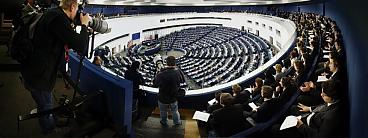The danger of a ‘Grand Coalition’ in the European Parliament
The danger of a ‘Grand Coalition’ in the European Parliament
Political groups are free to work with each other, but in the European Parliament the centre-right European People’s Party (EPP) and the centre-left Party of Socialists and Democrats (PSD), together with the centre-right Alliance of liberals and Democrats for Europe (ALDE) have formed a ‘Grand Coalition’ which is starting to present a downright danger. It’s stampeding in the direction of a federal Europe, and the general public who want just the opposite – ‘less Brussels’ – are pushed aside as people who just don’t get it. Systematically the influence of smaller, critical political groups is being eroded. This is a way of doing things which is scarcely democratic, and which is unworthy of a parliament.
Last week the European Parliament Committee on Institutional Affairs voted on the infamous Verhofstadt report. This report, from ALDE leader Guy Verhofstadt, contains a whole series of proposed amendments to the EU Treaty. Unfortunately these don’t accord with the views of the SP as to Europe’s direction, which in our opinion demands a looser form of cooperation. The number of opt-outs will have to be reduced., while on all sorts of terrains where national parliaments still have the last word, Brussels will also, should these proposals be passed, be running the show. This applies to defence, the police and the system of justice, and social policy. And even the member states’ taxation policies would be regulated at European level. The European Commission would be restructured, becoming a true government with its own ministers.
For Verhofstadt and the ‘Grand Coalition’ all the protests in the member states count for nothing. They hitch their federal dream to the interests of the big corporations, who are the only ones who see the utility of such a superstate. They know that they stand at a great distance from the general public and that with their tens of thousands of lobbyists they have a great deal more influence than anyone else. This is downright dangerous. You can only fill the bucket so far before the water overflows.

But there’s more. The same Committee has also adopted a report on the EP rules of procedure, and in that document as well’ the ‘Grand Coalition’ has imposed its will. As a result, it will become even more difficult for the smaller groups and for individual MEPs to operate effectively. Higher thresholds have been set for requesting roll-call votes (which enable voters to discover how their individual representatives voted) and for the presentation of motions. Putting questions, whether written or oral, will also be made more burdensome. Only for the big groups will all of this remain relatively simple, as they have sufficient MEPs in their ranks to meet the heavier criteria.
Democracy means taking account of minorities, which in the EP implies that the ‘Grand Coalition’ should allow some space for critical voices. This goes doubly when you consider that the minority in the European Parliament may actually represent a majority among the peoples of the EU. What are the centre-right and centre-left parties which make up the Grand Coalition afraid of? Could it be that their power play is motivated by a lack of substantive arguments? However that may be, in 2019 fresh European Parliament elections will be held, while before that, next year, there are national elections in Germany, France and the Netherlands. These present fine opportunities to make the parties of the Grand Coalition pay up. Fortunately, in cooperation with our sister parties, we can offer an alternative: the Modern Left. In this there’ll be no plotting and scheming with big capital, but instead the citizen, in his or her neighbourhood, will be the basis. You know what you need to do to bring this about.
- See also:
- Dennis de Jong
